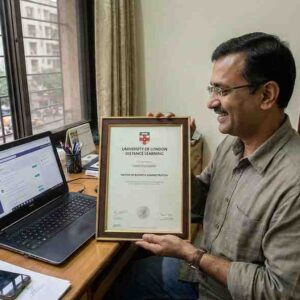As students in India navigate their senior secondary school years, they often face the dual challenge of completing their board examinations and preparing for various competitive exams. These competitive exams, which include the JEE (Joint Entrance Examination) for engineering, NEET (National Eligibility cum Entrance Test) for medical courses, CLAT (Common Law Admission Test) for law, and many others, are crucial for securing admission to prestigious universities and professional courses. Here’s a comprehensive guide on how schools can effectively prepare students for these rigorous assessments, ensuring they are well-equipped to succeed.
1. Early Introduction to Competitive Exam Formats
Familiarization with Exam Patterns:
- Schools should begin introducing the format and structure of competitive exams early in the senior secondary curriculum. This includes familiarizing students with the types of questions, marking schemes, and time management strategies specific to each exam.
Mock Tests and Practice Sessions:
- Regular mock tests should be integrated into the school schedule to give students a practical understanding of the exam conditions. These sessions help in building stamina for the actual exam and allow students to identify and improve on their weak areas.
2. Customized Study Plans and Academic Support
Tailored Study Materials:
- Schools can provide customized study materials that are specifically designed to address the syllabus and question patterns of various competitive exams. This may include comprehensive notes, problem sets, and past exam papers.
Special Coaching Sessions:
- For students requiring additional support, schools can arrange special coaching sessions focused on competitive exams. These sessions can be conducted by faculty members or external experts who specialize in exam preparation.
Integration with School Curriculum:
- Where possible, the school curriculum should be aligned with the content of competitive exams. This ensures that students are preparing for their board exams and competitive tests simultaneously, maximizing efficiency and coherence in learning.
3. Psychological Preparation and Stress Management
Counseling Services:
- Schools should provide counseling services to help students manage the stress and anxiety associated with competitive exams. Counselors can offer techniques for mental relaxation, stress management, and maintaining a positive outlook.
Building Resilience:
- Encouraging a resilient mindset is crucial. Schools can hold sessions on handling failure and learning from mistakes, which are vital skills for students facing highly competitive environments.
4. Encouraging Group Study and Peer Learning
Study Groups:
- Facilitating study groups among students can create a supportive learning environment. Peer-to-peer interaction often helps in clarifying doubts and deepening understanding of complex topics.
Seminars and Group Discussions:
- Regular seminars and discussion forums on key topics can enhance conceptual understanding and encourage a collaborative approach to learning, which is often more engaging and effective than solo study.
5. Physical and Recreational Balance
Scheduled Breaks and Physical Activities:
- Ensuring that students maintain a balanced routine is crucial. Schools should encourage regular physical activities and sports, which are not only vital for physical health but also beneficial for mental well-being.
Hobbies and Extracurricular Activities:
- Engaging in hobbies and extracurricular activities can provide necessary breaks from the intensity of exam preparation, helping to keep stress levels manageable and maintain overall student happiness.
6. Engagement with Successful Alumni
Mentorship Programs:
- Schools can set up mentorship programs where successful alumni who have previously aced these exams can share their experiences, tips, and strategies. This can provide current students with relatable role models and practical advice.
Alumni Talks and Workshops:
- Inviting alumni to conduct workshops or talks on effective study techniques, time management, and exam strategies can be highly motivational for current students.
7. Leveraging Technology in Preparation
Online Resources and Digital Tools:
- Schools should make use of online resources and digital tools that can aid in competitive exam preparation. This includes subscription to educational websites, use of apps for practice questions, and online video tutorials.
Virtual Mock Exams:
- Conducting virtual mock exams can help students get accustomed to digital platforms, especially since many competitive exams are now conducted online.
Conclusion: A Comprehensive Approach to Competitive Exam Preparation
Preparing for competitive exams requires a well-rounded approach that addresses academic, psychological, and physical aspects. Senior secondary schools play a crucial role in guiding students through this challenging phase with the right resources, support systems, and strategies. By creating an environment that nurtures learning, resilience, and well-being, schools can help students not only succeed in competitive exams but also set a strong foundation for future academic and professional endeavors.










